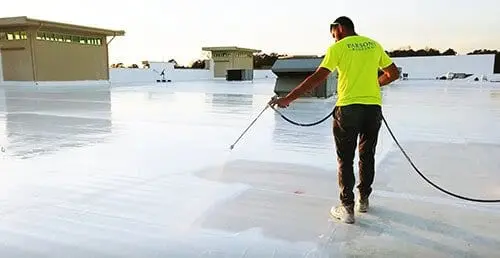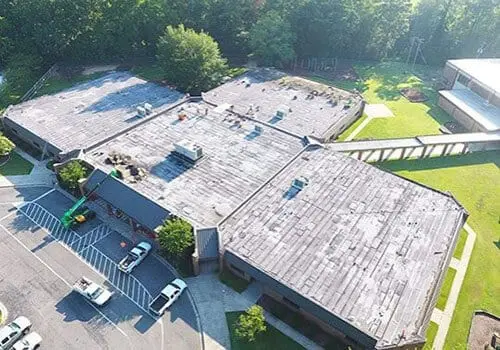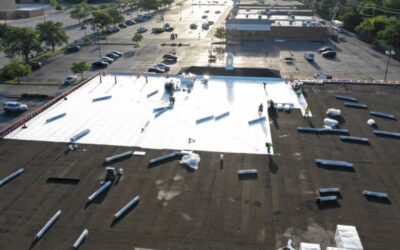Coating Vs Replacement for a commercial roof is the most frequently asked questions throughout the roofing industry. Replacing the roof of your commercial building is no small undertaking. Aside from the financial commitment, it can be a disruptive and inconvenient process. Sometimes, it can even shut down business during production. It may not always be necessary to replace a roof, though. In many cases, a commercial roof coating may be the best solution. Here is how to know whether to coat or replace your commercial roof.
Coating Vs Replacement: Coating Your Commercial Roof Is Cost-Effective
A silicone roof coating is an ideal solution for large and small roof areas. A roof coating can cost as much as 75% less than a commercial roof replacement, while still carrying the same warranty as a single-ply roof would (TPO, EPDM, PVC). Coatings are completely tax deductible in year 1 due to the classification of building maintenance rather than being classified as a capital expenditure.
This means that you don’t have to amortize your tax deductions over time like you would if you replaced your roof. Furthermore, Georgia Power pays a rebate to you after a silicone roofing system is applied. 98.8% of the sun’s energy does not penetrate a silicone coating system. This means big savings on energy bills down the road too.

Coating Vs Replacement: When you should Coat or Replace Your Commercial Roof
Our experts recommend coating a roof instead of replacing a roof only if certain conditions are met. The most common mistake by roofing contractors regarding roof coatings is that they do not follow these guidelines before deciding to coat a roof.
#1 Is the Surface Smooth Enough to Coat?
Coatings require a smooth to semi-smooth surface for proper application. If the building has a ballasted roof (river rocks on top) or a tar and gravel roof it is not a good candidate for a coating. There will likely be holes from where the coating didn’t seal around all the undulations in the roof’s surface, therefore, making it an ineffective solution.

#2 Is the Roof Dry Enough to Coat?
Most commercial roofs have some form of porous material between the roof surface and the roof deck. These are common in the form of polyisocyanurate boards, fiberboards, fanfold, or perlite. When a roof leaks, these materials become saturated with moisture. If a coating were to be applied over a saturated roof, the moisture would likely end up coming back up through the roof surface over time. This would cause penetrations in the coating, which would leave it ineffective at keeping water out of the building.
#3 Will the Coating System Stay Adhered to The Existing Roof?
Sometimes, a commercial roof will meet the first two criteria, but still shouldn’t be applied. This is because some roofs have situations where the existing roof will not stay on over time, and this means that a silicone coating on top will also not stay on. This can occur when a roof has been previously coated with a less effective product that will not hold its adhesion to the roof. This basically means that the coating underneath will flake off the roof. Also, some roofs are so poorly installed (believe it or not!) that they cannot be trusted to stay on the building. Roof coatings need to go over a sound roof in order to operate at the optimum level.

Coating Vs Replacement: Great Warranties
A lot of customers worry about the warranty of a silicone coating system. Our silicone coatings come with a better warranty than you would get with a membrane roof installation. Why? The biggest reason is that our silicone system warranty does not have a ponding water exception in the warranty. Most membrane warranties will be voided if the water stays ponded on a roof for more than 48 hours (on sunny days). Silicone warranties do not have this clause because water does not affect the material. Water could stay in constant contact with silicone coatings for an indefinite amount of time without affecting the roof at all.
Additionally, silicone-coating systems come with a 50-year product warranty through Gaco Western, our coating manufacturer. Their silicone coating, S-2000, does not deteriorate over time. This is because it is made from silica, which is the same as glass and sand. Silica doesn’t break down in UV light like all other roofing products.

Coating Vs Replacement: Additional Questions?
The experts at Parsons Roofing routinely work with business owners just like you who want cost-effective solutions for their roof needs. Contact us today to learn more about your options and schedule a roof inspection!




